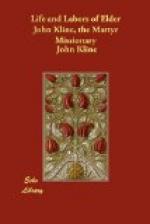I aimed to set forth, in the practical part of my discourse, a few thoughts based on the last part of the verse: “Their works do follow them.” Our works are as sure to follow us from this world to the next as they are when we remove from one place to another in this. Let any one come among us, no matter from where, and he brings his character with him. If that is good, good works will follow him. They follow not only in the way of reports we may receive from those among whom he lived before he came among us, but they follow all he does while here. In this consists the blessedness of those who die in the Lord. In heaven the same good works follow them in all they do, only in much greater perfection, that accorded with the good will in their hearts that characterized their lives while here. The lives of good men are so conjoined with the Lord, because from the Lord, that whatever good they do in the way of helping others he accounts it as done to him. Indeed, this blessed following is the ground of proof that they are of his sheep. “Inasmuch as ye have done it unto the least of these my brethren, ye have done it unto me.” Will not that be a glorious and happy following? Is it not something worth sacrificing our life and our all in this world for? And that day will surely come. Just as sure as we live it will come, for the Scripture cannot be broken. This blessed following of good works will be sure to receive on that day the welcome plaudit: “Well done, good and faithful servant; enter thou into the joy of thy Lord.”
WEDNESDAY, December 25. Christmas day. Meeting in Keagey’s schoolhouse. Matthew 2 was read. Brother Daniel Miller spoke beautifully in the German language on the advent of the Lord Jesus. His main subject was the love of the Father, the good will toward men that gave the only begotten Son to redeem and save them.
He said: “The day is unimportant. We may have Christ’s birthday correct, or we may not. I am not historian enough to speak positively on this point. But one thing there is upon which I can speak positively; and all the enemies of Jesus are unable to wrest the conviction of that truth from my heart; and that thing is this, that ’God so loved the world, that he gave his only begotten Son, that whosoever believeth on him should not perish, but have everlasting life. For God sent not his Son into the world to condemn the world, but that the world through him might be saved.’ It has pleased our heavenly Father to tell us about our Savior’s birth; how lowly it was, in a stable; and that he was laid in a manger, which means a kind of box from which horses take their food; and that a star in the east, sometimes called the Star of Bethlehem, guided the wise men who came from the east to see the infant, Jesus, to the place where he lay. Those good men hardly knew that this beautiful star was but an emblem of the leadings of God’s revealed Truth. But it is so; for all the light of prophecy centered in that star which showed the time and place of the birth of the Son of God. Some seem to think the star was only a natural light, such as natural eyes could see, but I do not think so. I rather think it was a heavenly light, and that it could be seen only by such as loved the hope of our Lord’s coming and were ready to rejoice at his birth.




